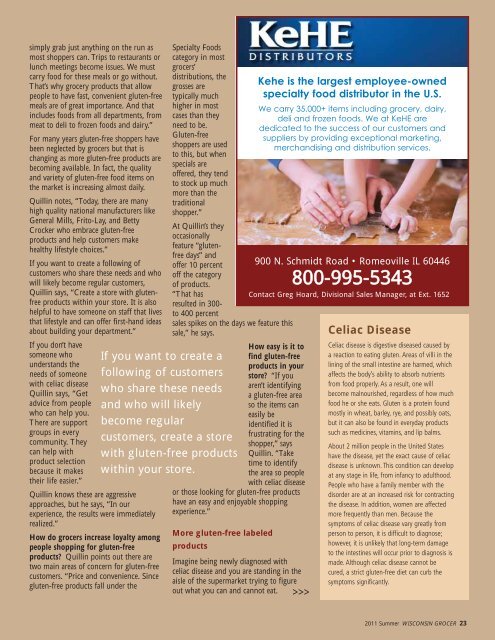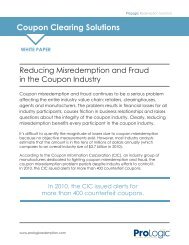Gluten-Free Stores - Wisconsin Grocers Association
Gluten-Free Stores - Wisconsin Grocers Association
Gluten-Free Stores - Wisconsin Grocers Association
Create successful ePaper yourself
Turn your PDF publications into a flip-book with our unique Google optimized e-Paper software.
simply grab just anything on the run as<br />
most shoppers can. Trips to restaurants or<br />
lunch meetings become issues. We must<br />
carry food for these meals or go without.<br />
That’s why grocery products that allow<br />
people to have fast, convenient gluten-free<br />
meals are of great importance. And that<br />
includes foods from all departments, from<br />
meat to deli to frozen foods and dairy.”<br />
For many years gluten-free shoppers have<br />
been neglected by grocers but that is<br />
changing as more gluten-free products are<br />
becoming available. In fact, the quality<br />
and variety of gluten-free food items on<br />
the market is increasing almost daily.<br />
Quillin notes, “Today, there are many<br />
high quality national manufacturers like<br />
General Mills, Frito-Lay, and Betty<br />
Crocker who embrace gluten-free<br />
products and help customers make<br />
healthy lifestyle choices.”<br />
If you want to create a following of<br />
customers who share these needs and who<br />
will likely become regular customers,<br />
Quillin says, “Create a store with glutenfree<br />
products within your store. It is also<br />
helpful to have someone on staff that lives<br />
that lifestyle and can offer first-hand ideas<br />
about building your department.”<br />
If you don’t have<br />
someone who<br />
understands the<br />
needs of someone<br />
with celiac disease<br />
Quillin says, “Get<br />
advice from people<br />
who can help you.<br />
There are support<br />
groups in every<br />
community. They<br />
can help with<br />
product selection<br />
because it makes<br />
their life easier.”<br />
Quillin knows these are aggressive<br />
approaches, but he says, “In our<br />
experience, the results were immediately<br />
realized.”<br />
How do grocers increase loyalty among<br />
people shopping for gluten-free<br />
products? Quillin points out there are<br />
two main areas of concern for gluten-free<br />
customers. “Price and convenience. Since<br />
gluten-free products fall under the<br />
Specialty Foods<br />
category in most<br />
grocers’<br />
distributions, the<br />
grosses are<br />
typically much<br />
higher in most<br />
cases than they<br />
need to be.<br />
<strong>Gluten</strong>-free<br />
shoppers are used<br />
to this, but when<br />
specials are<br />
offered, they tend<br />
to stock up much<br />
more than the<br />
traditional<br />
shopper.”<br />
At Quillin’s they<br />
occasionally<br />
feature “glutenfree<br />
days” and<br />
offer 10 percent<br />
off the category<br />
of products.<br />
“That has<br />
resulted in 300-<br />
to 400 percent<br />
sales spikes on the days we feature this<br />
sale,” he says.<br />
How easy is it to<br />
find gluten-free<br />
products in your<br />
store? “If you<br />
aren’t identifying<br />
a gluten-free area<br />
so the items can<br />
easily be<br />
identified it is<br />
frustrating for the<br />
shopper,” says<br />
Quillin. “Take<br />
time to identify<br />
the area so people<br />
with celiac disease<br />
or those looking for gluten-free products<br />
have an easy and enjoyable shopping<br />
experience.”<br />
If you want to create a<br />
following of customers<br />
who share these needs<br />
and who will likely<br />
become regular<br />
customers, create a store<br />
with gluten-free products<br />
within your store.<br />
More gluten-free labeled<br />
products<br />
Imagine being newly diagnosed with<br />
celiac disease and you are standing in the<br />
aisle of the supermarket trying to figure<br />
out what you can and cannot eat.<br />
Kehe is the largest employee-owned<br />
specialty food distributor in the U.S.<br />
We carry 35,000+ items including grocery, dairy,<br />
deli and frozen foods. We at KeHE are<br />
dedicated to the success of our customers and<br />
suppliers by providing exceptional marketing,<br />
merchandising and distribution services.<br />
900 N. Schmidt Road • Romeoville IL 60446<br />
800-995-5343<br />
Contact Greg Hoard, Divisional Sales Manager, at Ext. 1652<br />
>>><br />
Celiac Disease<br />
Celiac disease is digestive diseased caused by<br />
a reaction to eating gluten. Areas of villi in the<br />
lining of the small intestine are harmed, which<br />
affects the body’s ability to absorb nutrients<br />
from food properly. As a result, one will<br />
become malnourished, regardless of how much<br />
food he or she eats. <strong>Gluten</strong> is a protein found<br />
mostly in wheat, barley, rye, and possibly oats,<br />
but it can also be found in everyday products<br />
such as medicines, vitamins, and lip balms.<br />
About 2 million people in the United States<br />
have the disease, yet the exact cause of celiac<br />
disease is unknown. This condition can develop<br />
at any stage in life, from infancy to adulthood.<br />
People who have a family member with the<br />
disorder are at an increased risk for contracting<br />
the disease. In addition, women are affected<br />
more frequently than men. Because the<br />
symptoms of celiac disease vary greatly from<br />
person to person, it is difficult to diagnose;<br />
however, it is unlikely that long-term damage<br />
to the intestines will occur prior to diagnosis is<br />
made. Although celiac disease cannot be<br />
cured, a strict gluten-free diet can curb the<br />
symptoms significantly.<br />
2011 Summer WISCONSIN GROCER 23
















